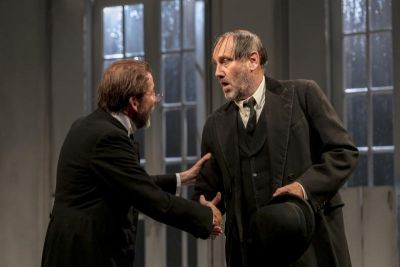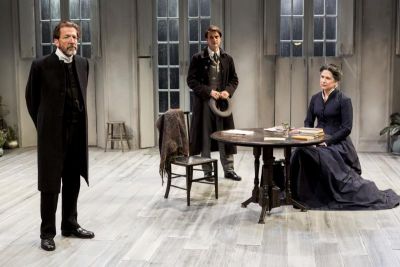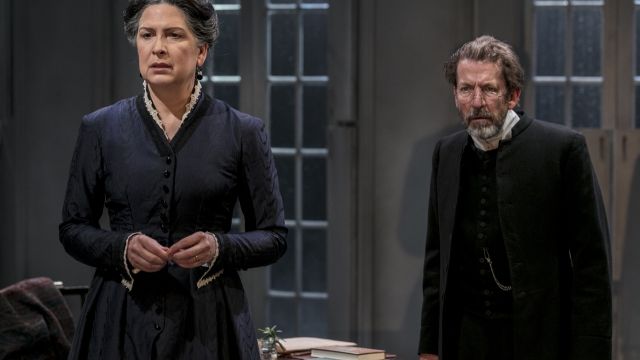Ghosts
Eamon Flack describes his adaptation as “ a fairly direct rendering of Ibsen’s play into a language that makes sense to us today but still retains the feeling of the past”. The “unspeakable subtext” of the plot that, in 1882, caused such controversy, may be less scandalous today – but a play that exposes the “ghosts” of oppressive interpretations of religion and marriage, domestic violence, adultery, alcoholism, incest, disease and euthanasia seems to speak as clearly to a contemporary audience as it should have done in the 19th century.
Thus Flack blends the past and present in a production that searches for the ‘joy of life’ in an atmosphere of dispiriting gloom. Designer Michael Hankin sets the scene in a sparsely furnished conservatory dominated by tall, grey-shuttered windows, the only relief the potted plants that seem to cower, with a couple of occasional tables, against cold walls. A table and three spindly chairs sit at the centre of the wide, grey floor. It is a space rather than a room. Rain beats relentlessly against the windows.
Helene Alving is about to dedicate an orphanage she has built in the memory of her late husband, Captain Alving, despite the fact that her marriage was unhappy and her husband an unfaithful philanderer. She hopes the orphanage will assuage her shame and bring the personal freedom promised in the feminist literature she reads. But she is dogged by one setback after another. Pastor Mandes, whom she has loved since their youth, rejects her affection. The orphanage burns down. Her son Oswald has fallen in love with the maid, Regina, who is really his father’s illegitimate daughter. As well, he has inherited the deranging effects syphilis from his father. In the end, there are only she and her son in a vast, stark room, surrounded by the ashes of the orphanage and the dream of what could have been.

Pamela Rabe is exceptional as Helene Alving. She finds the taut restraint and tight control of this woman who has hidden the reality of her disastrous marriage behind acts of philanthropy and self-denial. The grace in her movement belies the tension in her hands and face. Her carefully considered answers and reactions reflect a lifetime of self-control and consideration of others. Her face lights with joy as she talks of her son and a better life together – and fades to sorrow and indecision as she faces the reality of their future.
Tom Conroy is convincingly disturbed as Oswald, portraying a gamut of emotions as he faces the doom that the doctors in Paris have diagnosed. He paces, turns inward, reaches out then withdraws – his final request of his mother leaving them both in despair.
Robert Menzies portrays the inflexible Pastor Mandes with chilling lack of sympathy or support. His stooped stance and defined personal space show the rigidity of his uncompromising, religious dogmatism and his lack of empathy with those who reach out to him for help.
The young maid, Regina is played by Taylor Ferguson, who finds the naïve optimism of youth in her portrayal of this ill-fated character. She is bright and hopeful when with Oswald, deferential when with Helene and Mandes and seemingly ashamed when talking to her father, Jakob Engstrand. Her exit mixes all of these characteristics in a whirl of disappointment.

Colin Moody is Engstrand, an English seaman turned carpenter working on the orphanage. Moody finds the sullenness of hardship and defeat in this character who has raised Regina as his own and wants her to help him in his plan to start a Sailors Home.
Eamon Flack’s direction concentrates on retaining the feeling of the past pushing into the future. The weight carried by each of the characters defines their every action and the tenuousness with which they relate to each other. The distance between their hopes and their reality is emphasised constantly by the very space itself and its cold gloom.
Carol Wimmer
Photographer: Brett Boardman
Subscribe to our E-Newsletter, buy our latest print edition or find a Performing Arts book at Book Nook.

